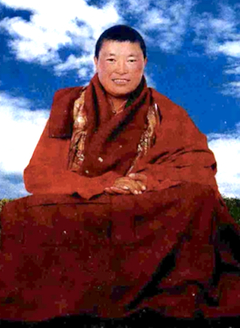Song of Advice
A Song of Advice[1]
by Tsultrim Wangmo[2]
I pray to my guru and the Three Jewels.
Let this old woman sing you a song of truth.
Listen well, ladies, you spiritual beings.
If you wish to accomplish a bit of Dharma,
Get rid of toxic thoughts as if they were poison.
Imbibe of good thoughts like medicine on death's door.
Without much anger, meditate on love and compassion.
Without much avarice, spend what you've gathered on Dharma.
Without much foolishness, let the Dharma tame your mind.
Without much jealousy, do whatever helps others.
Without much pride, keep a low profile and take the humblest position.
Without much desire, keep your vows and samayas.
Without wanting much for yourself, get along with others.
Without a lot of thoughts, let your resolve be singular.
Without a lot of activity, give your heart to Dharma.[3]
Without a lot of work, commit your body, speech, and mind to virtue.
Without a lot of traveling, stay in mountain solitudes.
Without a lot of bad friends, lean on good friends in tune with Dharma.
Without a lot of needs, be ok with whatever happens.
Without a lot of talking, recite the guru siddhi mantra.
No matter who it might annoy, stay in tune with Dharma.
Whatever happens to you, do not forget your guru.
Even at the cost of your life, be steadfast and courageous.
Empty talking helps nothing. Practice!
Just taking vows helps nothing. Preserve them like your life.
You need practice that will wipe away regrets, even as you die.
You need virtue that will wipe away future suffering.
You can't trust anyone in these degenerate times.
Without deceiving yourself, forget about saṃsāric activities.
Without losing heart, practice the teachings on death before it comes.
Without letting your body fall apart, commit your whole life to Dharma.
Without cutting off your good fortune, use your body for what is essential.
Toxic thoughts will cause your merit to vanish.
Ladies, don't entertain toxic thoughts.
This meat you eat will cause your birth in hell.
Ladies, give up the damnable food of flesh and blood.
Keep this in mind; it is sound advice.
Cultivate your inner experience and you will be an authentic practitioner.[4]
People in these degenerate times cannot be trusted.
Ladies, give your hearts to Dharma.
Ladies, may your every wish come true in accord with Dharma.
| Translated by Joseph McClellan, 2024
Bibliography
tshul khrims dbang mo. (n.d.). ʼdas log ma tshul khrims dbang moʼi rnam thar dge sdig blang dor gsal ba'i me long, pp. 11–12. Edited by gsang sngags bstan 'dzin. Ya chen o rgyan bsam gtan gling. BDRC W3CN5318.
Version: 1.0-20240216
-
The original song is untitled. It is found in Tsultrim Wangmo's memoirs. After meeting her root guru, Khenpo Akhyuk (mkhan po a khyug) or Akhyuk Rinpoche Lungtok Gyaltsen (a khyug rin po che lung rtogs rgyal mtshan), in 2006 at Yachen Gar in Pelyul Country, he told her to write down, for posterity, her experiences of other realms as a delok, or revenant. In 2007, a team of women joined to help Tsultrim Wangmo record her stories. In the course of their work, as their faith in Tsultrim Wangmo grew, they requested teachings from her. She told them that she did not know how to give formal teachings and offered them this song of advice instead (tshul khrims dbang mo, p. 11). ↩
-
Tsultrim Wangmo (BDRC P3CN8484) was a twentieth-century delok, or revenant, born in the Kandze region of eastern Tibet in 1962 or 1963. After an eventful life of work, pilgrimage, and practice, she met her root guru, Khenpo Akhyuk, in 2006 at his encampment, Yachen Gar, where she remained. ↩
-
"Give your heart to Dharma" translates blo phugs chos la gtod, which might be rendered as "commit your soul to Dharma." Blo phugs connotes "innermost mind" and matches the figurative, though not metaphysical, sense of the English "soul." ↩
-
"Cultivate your inner experience" is a more literal rendering of nyams su longs, which is often translated simply as "practice." The next phrase, "authentic practitioner," translates yang dag chos pa, "authentic spiritual person" or "dharma person." ↩
